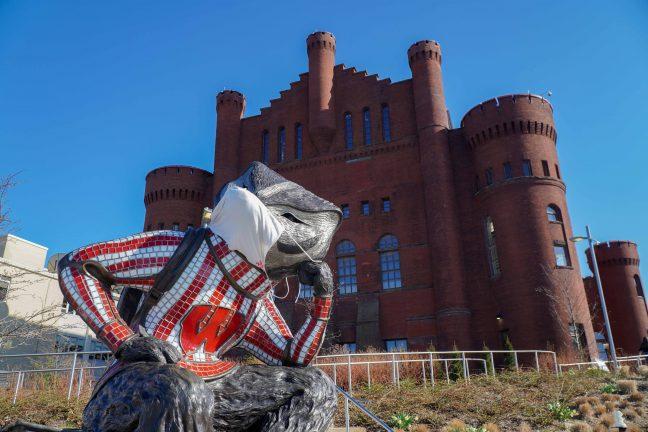As the one-year anniversary of the pandemic arrives in the U.S., state and local officials reflect on the trials and triumphs of public institutions’ responses to the COVID-19 outbreak.
While the first documented case of COVID-19 in Wisconsin hit in early February, Gov. Tony Evers declared a public health emergency March 12 — two days after the World Health Organization declared the virus an epidemic.
In a whirlwind of a week, Americans across the nation saw schools shut down and restaurants board up under a flurry of rapidly issued mitigation guidelines. One year of research, social distancing and quarantining later, the virus has killed over 6,500 Wisconsinites.
UW announces in-person, graduate-only spring 2021 commencement
Evers said he knew the severity of the pandemic before he issued the first official emergency declaration in an interview with WKOW reflecting on the one-year anniversary of the pandemic’s arrival in the state. Evers said Wisconsin Department of Health officials informed him in early 2020 that the virus would eventually hit the state and require mitigation.
“The idea that the day would come where we would require people to do their best to stay at home for a period of time … was under discussion and just careful watch throughout the early part of the year,” Evers said in the interview.
Evers said in the WKOW interview there have been a lot of ups and downs, though he said he is proud of Wisconsin residents’ overall response. Evers said one of several things he wishes would have happened in the state was a unified consensus with all state leaders on protective measures such as masks.
Evers said other major issues the pandemic brought included fixing holes in the states’ unemployment benefit system, which the economic recession dramatically revealed, and creating statewide standards for opening schools.
Evers hopes to tackle some of these continuing challenges in his proposed Badger Bounceback Agenda budget plan, which focuses on economic recovery with provisions to provide a larger state investment in the Wisconsin Economic Development Corporation than the last three budgets combined.
Gov. Tony Evers’ $91B budget proposal addresses education, justice reform, climate change
Over the past year, a microcosm of the issues faced at the state and national level manifested on the University of Wisconsin-Madison campus. March 10, UW-Milwaukee was the first public university in the state that extended their spring break and prepared to move classes online.
UW-Madison followed close behind, adding a week to spring break and moving classes online until April 10 on March 11. Administrators made the call to suspend all face-to-face instruction March 17.
Associated Students of Madison chair Matthew Mitnick said the university did well at the beginning of the pandemic by quickly moving classes online and permitting a pass/fail option for students to utilize due to the tumultuous virtual transition in the last six weeks of classes.
Though, Mitnick said the university’s response starting at the beginning of the fall 2020 semester has been “next to none.”
“Starting in the fall, [the university] just screwed up and everything has been a nightmare since August,” Mitnick said.
Mitnick said some key issues in their response included the university bringing students back to Madison, opening housing at a high capacity, neglecting to implement a pass/fail policy and interpreting financial aid guidelines too conservatively.
In an address made to the UW Board of Regents in February, UW-Madison Chancellor Rebecca Blank addressed the pandemic-related challenges faced by the university and how the campus community rose to meet some of those challenges.
UW will not enact fall pass/fail option despite students’ continuing advocacy
When the pandemic struck campus, Blank said the university converted over 8,000 courses’ instructional models to work in an online setting in the period of 10 days. Since then, UW conducted research on how to best organize classrooms to accommodate social distancing, manage air flow between rooms and optimize class schedules to limit traffic flow — all factors in the current campus hybrid learning model.
Blank said the campus also ramped up testing this spring, with estimates to conduct between 60,000 and 80,000 tests per week. Blank said the university also hopes to vaccinate all faculty and staff this semester and all students by the fall 2021 semester.
“By the time we reopen in the fall, I want to be able to vaccinate any student who arrives who is not previously vaccinated,” Blank said. “We are set up to do this, we simply need to get the dosages … that is the only way we are going to ensure a more normal semester for fall 2021.”
Mitnick said UW-Madison must focus on key issues such as pass/fail policies, grading and virtual learning accommodations for students, Honorlock concerns and financial aid issues.
Above all, Mitnick said one of the university’s greatest shortcomings has been its failure to act with urgency to address students’ concerns.
“It’s easy for some in a crisis and a pandemic to just turn a blind eye to just look away,” Mitnick said. “But then you go into the other side and it’s chaos, and it’s because those people have done nothing.”
As the vaccine is rolled out across the state, Mitnick said he believes the next session of ASM will be prepared to tackle future issues as the pandemic persists.
Blank said while the campus has been “a different place with COVID,” they hope to return to more normal operations later in 2021.
This article was updated on March 18 at 12:55 a.m. to reflect information about UW’s COVID-19 mitigation response from the Chancellor’s Board of Regent’s address.


















